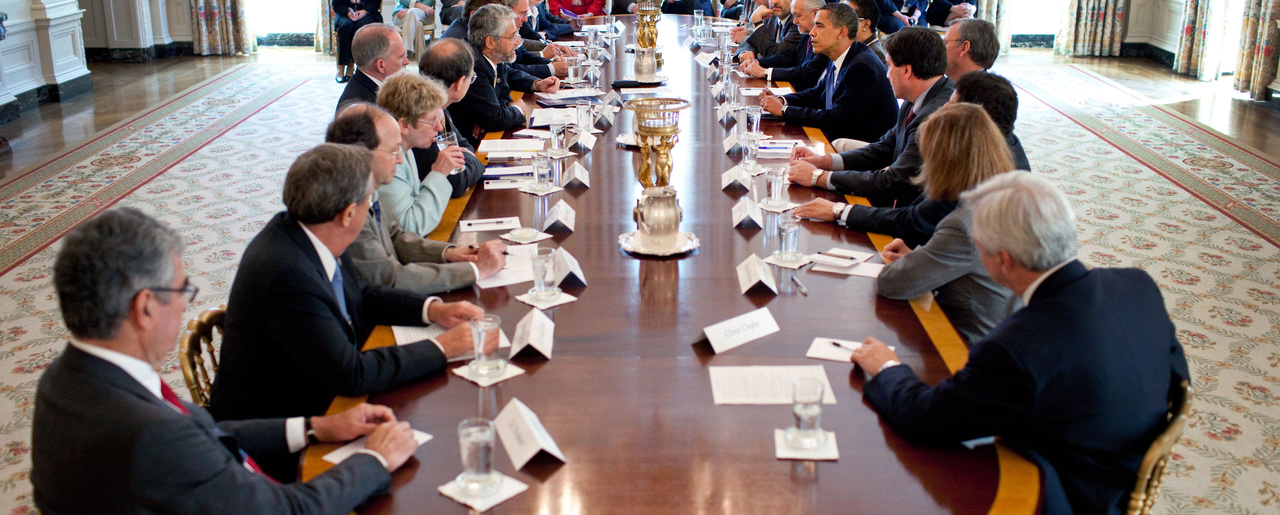Welcome to Our Research Archive
Search and filter by content type, issue area, author, and keyword
September 16, 2024
How the Vetocracy Paralyzes Progress
Political scientist Francis Fukuyama is right, at least about one thing. The American political system is a vetocracy, a system ruled by vetoes. And in recent decades, this excessive power of the veto has paralyzed decision-making at every level, frustrating efforts to build homes, nuclear power plants, and solar and wind projects; add new hospital…

September 13, 2024
The Politics of American Energy Policy
In the U.S. presidential debate earlier this week, the Democratic nominee Kamala Harris offered a strong endorsement of not just the technology of fracking but also of fossil fuels: I was the tie-breaking vote on the Inflation Reduction Act, which opened new leases for fracking. My position is that we have got to invest in diverse sources…

September 9, 2024
California’s SB 1047 Moves Closer to Changing the AI Landscape
Last week, the California State Assembly passed SB 1047, a controversial AI safety bill that supporters contend would regulate advanced AI models to reduce the possibility of AI going haywire and posing a serious threat to people. Formally titled the Safe and Secure Innovation for Frontier Artificial Intelligence Models Act, SB 1047 now heads to Gov….

September 6, 2024
Social and Physical Theories of Technological Stagnation
Among those who believe that technological change has stagnated, there are two broad categories. One social/institutional theory of stagnation, often associated with Peter Thiel, claims that the world has entered a period of technological stagnation due to avoidable social and institutional factors. Thiel and others in this camp argue that societies have chosen safety, regulation,…

September 2, 2024
Your Autonomous Vehicle Ride Might Take a While
For a time, when I wanted to make a point that AI hype was overblown, I would just cite Elon Musk’s various predictions about autonomous vehicles (AV). In 2013, Musk predicted that by 2016 Tesla would be making self-driving cars. In 2016, the company unveiled a demonstration video in which a Tesla Model X seemed to be driving itself,…

August 30, 2024
Data Center Electricity Use V: Implications
Yesterday’s earnings announcement from Nvidia brings my data center electricity use series full circle: Its now-dominant data center segment increased revenue to $26.3 billion—more than 2½ times what that business generated a year earlier. Adjusted operating income for the quarter more than doubled year over year to $19.9 billion. Nvidia’s overall top and bottom lines beat Wall…

August 30, 2024
Lost in Space
More than 30 years ago I wrote a master’s thesis that evaluated NASA’s Space Shuttle program (you can read the publications that followed here and here). As I turned to my PhD dissertation, I decided to move on from human space flight. Over the years that followed I felt like there was something left unfinished from my work…

August 26, 2024
VIPER’s Failure and the Future of Space Exploration
Earlier this year, NASA’s most advanced lunar rover—the Volatiles Investigating Polar Exploration Rover or VIPER—seemed to be on track to the moon. Engineers integrated the VIPER’s final instrument of four in February. By April, the golf-cart-sized rover stood “taller and more capable than ever” after its mast was installed and it passed a crucial review. The fully assembled VIPER…

August 26, 2024
What Future for U.S.-China Science and Technology Collaboration?
On Tuesday this week the U.S.-China Science and Technology Agreement (STA) is due to expire unless the U.S. and China can agree on its extension. Today I provide some background on the agreement, why it is now being debated, and my view on what should happen next. STAs are a common tool of science diplomacy. The…

August 22, 2024
Data Center Electricity Use IV: Unrealistic Emissions Targets?
Large-scale, dynamic social and economic change is often more difficult, incremental, and slower than anticipated. Consider James Watt and Matthew Boulton in Birmingham in 1776, having invented and refined the double-acting steam engine. Watt patented the invention that year, a breakthrough that would ultimately become a hallmark of the British Industrial Revolution and propel its…